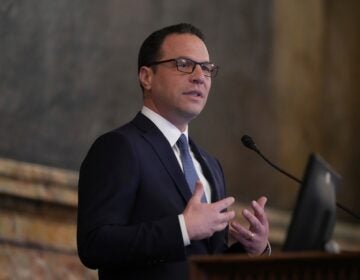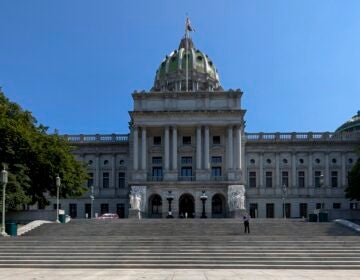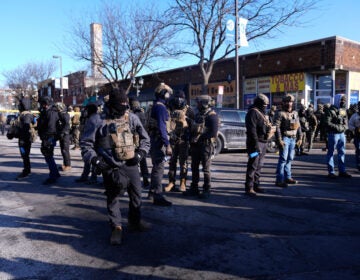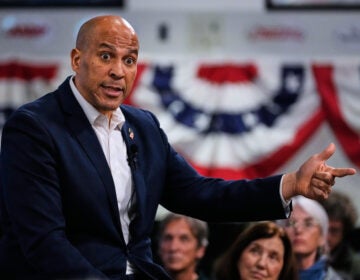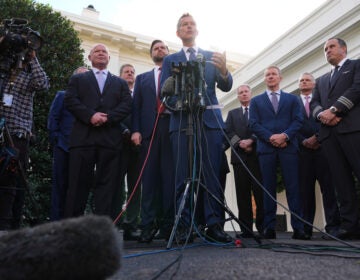Political gridlock continues over Pa. budget, straining finances for counties, schools, nonprofits
Despite their insistence a few weeks ago that a deal was as near as a few days away, neither chamber convened in the Capitol for a voting session during the week of Sept. 15.

Gov. Josh Shapiro shakes hands with state Senate Majority Leader Joe Pittman (right) in 2023. (Commonwealth Media Services)
This story originally appeared on WITF.
State lawmakers had a busy week.
Both Republican and Democratic caucuses in the Senate held golf outings at courses in the Pittsburgh area to benefit their campaign committees ahead of next year’s midterms.
Each night saw House members of either party hosting campaign fundraising events. Those include a Democrat’s “End of Summer Party” in Bucks County and a Republican’s “2nd Amendment Shooting Classic, Pig Roast & Brew” in Schuylkill County.
And Gov. Josh Shapiro made several public appearances around the state to promote his administration’s work, crisscrossing the state from Pittsburgh to Chester and Lehigh counties to Philadelphia.
Fundraising and good old-fashioned politicking, it seems, were more important than resolving the state’s months-long budget impasse.
Despite their insistence a few weeks ago that a deal was as near as a few days away, neither chamber convened in the Capitol for a voting session during the week of Sept. 15, and the budget bill advanced by the House last week sat idle in a House committee without any updated spending figures.
Meanwhile, schools, counties and nonprofits — and the people they serve — are the ones suffering from the political gridlock. Their state payments have stalled since July 1. If they haven’t done so already, many are considering lines of credit to offset the missing dollars. Paying the interest on those loans will fall onto taxpayers.
Lawmakers in Harrisburg still appear far apart on many of the same sticking points, spanning education and human services spending, as well as whether to tax and regulate games of skill. And details remain scarce on what policies they’ve reached consensus on.
Senate Republicans have largely focused on enacting a lower total spending number than the $51.4 billion plan proposed by Shapiro earlier this year. They’re also looking to reform state spending on public education, Medicaid and the Supplemental Nutrition Assistance Program.
House Democrats — after their $50.6 billion budget from July saw no action in the Senate — rejected the GOP’s pitch last month to pass a budget that would continue state payments at last year’s rates until a final deal is signed.
Shapiro’s proposed compromise of a $49.9 billion plan, as first reported by Spotlight PA, has seemingly not moved the needle.
In nearly every public appearance, when asked about the budget, Shapiro has noted the number of days it’s been since his Feb. 4 budget address and cast blame on Senate Republicans for the delay.
The first-term Democrat was notably frustrated during a Thursday news conference and took another jab at the Senate leadership.
“I can’t write the budget, propose the budget, vote on the budget and sign the budget,” Shapiro added. “I can do three of those four things, but at some point, they’ve got to show up for work and vote on the budget.”
Narrowly divided government
Sen. Majority Leader Joe Pittman, R-Indiana, said the tone of the budget negotiations “reset” after the two parties reached a deal to fund SEPTA — the Southeastern Pennsylvania Transportation Authority.
On Friday, he said in an interview that as he sits at the negotiating table, he feels an “urgency” to complete a final deal for those relying on state dollars. But for now, he said he’s done trying to predict when lawmakers will finalize a spending plan.
“Having that issue (SEPTA) set aside, on one hand, is helpful, but on the other hand, it’s had a bit of a ripple effect on how we manage the rest of the budgetary conversations,” Pittman said. He did not elaborate.
Though the total spend number is a major focus of his caucus, Pittman noted that minimizing the amount pulled from the state’s total reserves (nearing $11 billion) remains another priority.
“We realize we’re not going to resolve a structural deficit overnight, but we have to take steps to make sure that it’s manageable in future years,” Pittman said.
Republicans hold a 27-23 majority in the Senate; therefore, they can survive just one defection on a budget vote. Two defections would let Lt. Gov. Austin Davis, a Democrat, cast a tie-breaking vote.
And conservative members of the Pennsylvania Freedom Caucus, like state Sen. Dawn Keefer, R-York, have threatened to withhold their votes for any deal that does not remove Pennsylvania from the Regional Greenhouse Gas Initiative. Keefer also wants expanded access to public school alternatives and has insisted that Pennsylvania’s total budget should remain at last year’s $47.9 billion.
“I recognize that we are in a divided government, and we’re going to have to figure out a way to achieve a balance that is acceptable to the majority of the Legislature,” Pittman said.
Pittman’s comments conflict with those of Beth Rementer, spokeswoman for House Majority Leader Matt Bradford, D-Montgomery. She said Senate Republicans have been unwilling to reach a bipartisan solution.
House Democrats’ majority is razor-thin. At 102-101, they can’t lose a single vote if legislation falls along partisan lines.
Rementer said Democrats would not consider a budget that “fails to invest in education, workforce development and human services.”
One word: ‘Compromise’
Former Gov. Tom Corbett, the most recent Republican to hold the chief executive role, said only one word comes to mind on how lawmakers can resolve the ongoing budget impasse — “Compromise.”
Not knowing the specific policies that are dividing the Republican and Democratic legislators this year, Corbett acknowledged that whatever passes this year will spend much more than the final budget he negotiated for the 2014-15 fiscal year, which spent $29 billion from the General Fund.
Corbett also said the lack of “outside pressure” on individual lawmakers from their constituents and the media has allowed them to grow lax in reaching a budget on time. He recalled in 2014 that he caught heat for passing a budget 10 days late.
County services
This is the fourth consecutive year that the state government began its fiscal year without a spending plan. Counties and schools are accustomed to such delays, but the expectation of a tardy budget doesn’t lessen its impact.
Kyle Kopko, executive director of the County Commissioners Association of Pennsylvania, estimated that anywhere from one-quarter to one-third of the average county’s budget is funded with state dollars. All of those funds have been frozen since the start of the state’s fiscal year on July 1.
“This is not how this process is supposed to work,” Kopko said.
Counties are required to provide services funded by the state, like those for children and youth, drug and alcohol, and mental and behavioral health. That rule remains even if the state doesn’t provide the money to keep the programs afloat, forcing many counties to consider cutting those services or seeking a short-term loan.
“October is going to be a tough month for the vast majority of counties,” Kopko warned.
Indeed, that’s what Lancaster County’s commissioners warned about recently. If the budget is not approved by Oct. 1 — a reality that grows ever likely — the commissioners said they would need to make 60% partial payments to reimburse social-services providers.
“We need people to speak up because at some point these services could be in jeopardy, just simply because people can’t really do their job and come up with a state budget,” Commissioner Ray D’Agostino said at the commissioners’ Sept. 16 work session. “That’s unacceptable.”
Lancaster is far from alone.
Westmoreland County is facing a financial crisis deepened by the budget impasse that could force layoffs, service cuts and facility closures, according to TribLive.
And at least 36 of Pennsylvania’s 67 counties – including Berks, Montour and Dauphin – have passed resolutions urging state officials to end the impasse, warning of the harm further delays in payments could cause.
‘Fiscally irresponsible’
Schools are being hit just as hard as counties without state payments.
The School District of Lancaster was forced to take a $35 million loan to pay its bills, and Steelton-Highspire in Dauphin County is considering a similar move.
Lebanon School District, which receives more than 70% of its budget from the state, has paused in-school tutoring and all after-school programming, according to LebTown.
The impact on schools has been especially frustrating for some rank-and-file lawmakers who have little say about the timeliness of finalizing a state budget.
First-Term state Rep. Nikki Rivera, D-Lancaster, for example, urged readers of her weekly newsletter to call their state senators and demand action. She listed phone numbers for senators whose districts overlap with hers — Scott Martin, a Republican who helms the Appropriations Committee, and James Malone, a first-term Democrat.
Rivera, a former president of the Manheim Township school board, largely blamed Republicans in the Senate for the budget stalling, saying their “inability to follow through” on the expectation of passing a “sound budget” has hurt many across the state.
“I think there’s confusion between fiscal conservatism and fiscal responsibility — this budget situation is fiscally irresponsible,” Rivera said.
School districts are having to make decisions without knowing when or how much funding will come from the state.
“This uncertainty has real consequences,” Mackenzie Christ, director of marketing and communications at Pennsylvania School Boards Association, said in an email. “Districts are delaying hiring, postponing repairs, scaling back technology upgrades and limiting program enhancements — all because they lack the necessary financial clarity and resources.”
She said the budget delay also “undermines (schools’) ability to provide students with the high-quality education and support they deserve.”
Though her organization has not tracked the number of districts taking out loans, Christ said more than $2 billion in state payments have not been distributed to schools over July and August.
Meanwhile, Pennsylvania’s taxpayers await actual action by the governor and the General Assembly.
One constituent recently wrote to his local newspaper saying that more public and media attention should focus on the budget delay.
“Why not print a counter on the front page listing days without a budget daily(?)” he wrote in an email. “Under that list the amount of vacation times of the (House, the Senate and the governor.)
WHYY is your source for fact-based, in-depth journalism and information. As a nonprofit organization, we rely on financial support from readers like you. Please give today.


